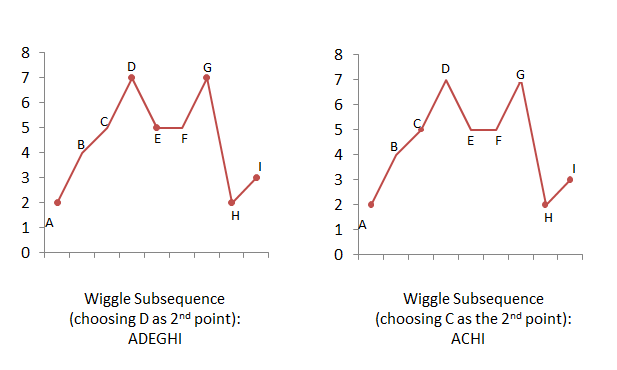leetcode-Wiggle Subsequence-376
For example, [1,7,4,9,2,5] is a wiggle sequence because the differences (6,-3,5,-7,3) are alternately positive and negative. In contrast,[1,4,7,2,5] and [1,7,4,5,5] are not wiggle sequences, the first because its first two differences are positive and the second because its last difference is zero.
Given a sequence of integers, return the length of the longest subsequence that is a wiggle sequence. A subsequence is obtained by deleting some number of elements (eventually, also zero) from the original sequence, leaving the remaining elements in their original order.
Examples:
Input: [1,7,4,9,2,5] Output: 6 The entire sequence is a wiggle sequence. Input: [1,17,5,10,13,15,10,5,16,8] Output: 7 There are several subsequences that achieve this length. One is [1,17,10,13,10,16,8]. Input: [1,2,3,4,5,6,7,8,9] Output: 2
Follow up:
Can you do it in O(n) time?
该题贪心和DP都能做
贪心策略1:3个点为一个局部条件,
不满足的去掉中间那么点,只关心3个数的斜率是否满足条件,用3个数来记录下标,记录逻辑上3个评定的数字

ABC时 贪心策略去掉B,反证:如果去掉A 那么A之前的上限提高了,更不会得到更优解,C同理,因此去掉B是最优
同理ACD时去掉C,……
if (nums.size() == 0)return 0;
if (nums.size() == 1)return 1;
if (nums.size() == 2)
{
if (nums[0] == nums[1])return 1;
return 2;
}
int ret = 1;
if (nums[0] != nums[1] && nums[1] != nums[2] && nums[2] != nums[0])ret++;
int d = nums[2] - nums[1];
int a = 2;
int b = 1;
int c = 0;
int d2 = 0;
for (int i = 2; i < nums.size(); i++)
{
a = i;
d2 = nums[b] - nums[c];
int d1 = nums[a] - nums[b];
if (d1*d2 < 0)
{
ret++;
d = a - b;
}
if (d2 != 0 && d1 != 0)
{
c = b;//V或者倒V的情况
b = a;
}
else
{
if (d1 == 0 && d2 != 0){ b=a; }
if (d2 == 0 && d1 != 0){ ret++; b = a; }
}
}
return ret;
还有更快的方法:仔细分析策略1,3个点中,a,b可以合为一个点,点c可以记录上一次有效数字的index
if (nums.size() < 2) return nums.size();
int p = 0, len = 1;
for (int i = 0; i < nums.size() - 1; ++i)
{
if (nums[i] == nums[i + 1]) continue;
if ((nums[i] - nums[p])*(nums[i + 1] - nums[i]) <= 0) p = i, ++len;
}
return len;